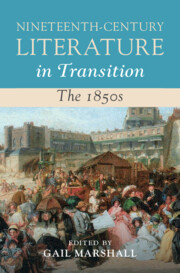Book contents
- Nineteenth-Century Literature in Transition: The 1850s
- Nineteenth-Century Literature in Transition
- Nineteenth-Century Literature in Transition: The 1850s
- Copyright page
- Contents
- Figures
- Contributors
- Acknowledgements
- Introduction
- Chapter 1 Pictures of Nature
- Chapter 2 ‘When I Came Back, It Was … to the Love of a New Generation’
- Chapter 3 George Eliot, the Westminster Circle, and Karl Ernst von Baer’s Embryological Germ Theory
- Chapter 4 The 1850s Sustainability Novel
- Chapter 5 Serialising London in ‘Twice Round the Clock’
- Chapter 6 Theatre in the 1850s
- Chapter 7 Beyond the Art of Conversation
- Chapter 8 Making Soldiers Count
- Chapter 9 Finding the Lost
- Chapter 10 British India in the 1850s
- Chapter 11 Christian Heroism
- Chapter 12 Horsepower in the Railway Age
- Chapter 13 Trauma, Gender, and Resistance
- Chapter 14 The Poetry of Married Life
- Chapter 15 George Eliot, Henry James, Realism, and Europe
- Index
Chapter 7 - Beyond the Art of Conversation
Richard Monckton Milnes and Cosmopolitan Diplomacy
Published online by Cambridge University Press: 02 January 2025
- Nineteenth-Century Literature in Transition: The 1850s
- Nineteenth-Century Literature in Transition
- Nineteenth-Century Literature in Transition: The 1850s
- Copyright page
- Contents
- Figures
- Contributors
- Acknowledgements
- Introduction
- Chapter 1 Pictures of Nature
- Chapter 2 ‘When I Came Back, It Was … to the Love of a New Generation’
- Chapter 3 George Eliot, the Westminster Circle, and Karl Ernst von Baer’s Embryological Germ Theory
- Chapter 4 The 1850s Sustainability Novel
- Chapter 5 Serialising London in ‘Twice Round the Clock’
- Chapter 6 Theatre in the 1850s
- Chapter 7 Beyond the Art of Conversation
- Chapter 8 Making Soldiers Count
- Chapter 9 Finding the Lost
- Chapter 10 British India in the 1850s
- Chapter 11 Christian Heroism
- Chapter 12 Horsepower in the Railway Age
- Chapter 13 Trauma, Gender, and Resistance
- Chapter 14 The Poetry of Married Life
- Chapter 15 George Eliot, Henry James, Realism, and Europe
- Index
Summary
Frederik Van Dam argues that the conceptualisation of new, ethical forms of cosmopolitanism in the 1850s is apparent in the informal diplomatic practices of Richard Monckton Milnes, an unduly neglected figure who was central to the literary world of the decade. Milnes’s ‘diplomatic cosmopolitanism’ found expression in his bibliophile activities as well as in his engagement with the legacy of European Romanticism, as can be seen in occasional poems such as ‘A Monument for Scutari’ (1855) and in his reviews of European fiction about Bohemia. Examining how the 1850s marked a new stage in the conduct of international affairs, Van Dam considers developments in the circulation of commodities as well as the breakdown of the so-called concert of Europe. Monckton Milnes embodies the diplomatic possibilities for literature and culture on the eve of a new European order.
Keywords
- Type
- Chapter
- Information
- Nineteenth-Century Literature in Transition: The 1850s , pp. 158 - 178Publisher: Cambridge University PressPrint publication year: 2025

